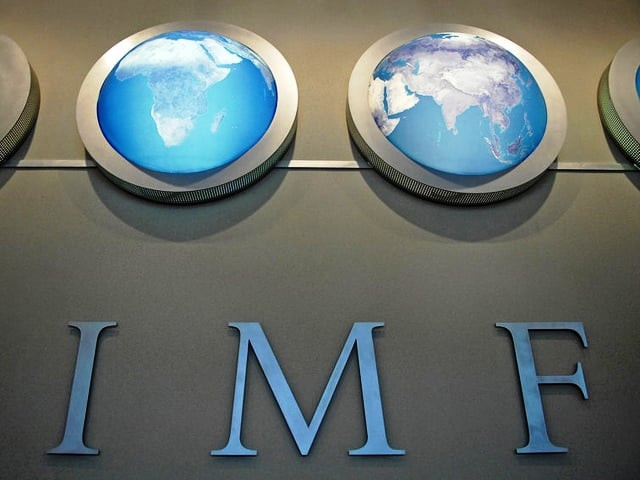Pakistan’s IMF man regrets move for bigger loan
Country will soon need debt relief, says economist.

Pakistan’s IMF man regrets move for bigger loan
“I made a mistake in arguing for the augmentation in the IMF board, and also got the IMF to allow us to use a part of the 2009 August tranche as a bridging loan for budgetary spending,” wrote Dr Ehtisham Ahmed, Pakistan’s former representative in the IMF board, in an email to a business tycoon and an economist.
In August 2009, the IMF augmented the size of Pakistan’s standby arrangement programme to $11.3 billion $3.7 billion more than approved in November 2008. Pakistan had sought the increase and permission to use a portion of it for budget financing after the Friends of Democratic Pakistan refused to provide a promised loan.
According to Dr Ahmed, “We are currently unable to repay the IMF for the $8 billion already borrowed. We will soon be looking for debt relief.”
Dr Ahmed, who is senior fellow in the Centre for Development Research, University of Bonn, criticised former finance minister Shaukat Tarin. “Had I known that Tarin had already thrown in the towel on tax reforms, I would never have made the (augmentation) case in the board,” wrote Dr Ahmed in the email on February 5, 2011.
Tarin was not available for comment.
“It initiates a debate on whether we needed such a huge amount and who is responsible for this mess,” said Dr Ashfaque Hasan Khan, former director-general of the debt office, when asked about Dr Ahmed’s comments. He said Dr Ahmed and Tarin were both to blame for the “irresponsible borrowing”.
Officials who in 2008 worked in the finance ministry said that there had been two views about the bailout programme within the ministry.
Asif Bajwa, who was then special finance secretary, believed that Pakistan needed the IMF’s confidence more than its money. The other view, backed by Shaukat Tarin, was that Islamabad must go for a big chunk of money to build its reserves.
“Those who advocated going for a big amount didn’t think about the cost at which the $11.3 billion was obtained,” a finance ministry official who had backed Bajwa’s plan said on condition of anonymity.
Dr Ahmed also downplayed the relevance of Pakistan’s $17 billion central bank reserves. “Policymakers and the public seemed to be lulled into a state of paralysis by the level of reserves. Unfortunately, these are not our reserves,” he wrote.
Of the $17.5 billion reserves, almost $8 billion is borrowed from the IMF, one billion from China and Saudi Arabia, and over $3.5 billion belongs to commercial banks, leaving the net balance at near the level in 2008 when Pakistan rushed to the IMF for a bailout.
Since last May the IMF has suspended the bailout package due to the government’s failure to carry out tax reforms and is still holding $3.5 billion in balance payments.
“Shaukat Tarin, being a banker, was keen more to restore confidence, but the problem is that despite the huge borrowing, if you take out the IMF and commercial banks’ reserves, Pakistan’s reserves are sufficient only for two-and-a-half months of imports,” said former finance minister Dr Hafiz Pasha.
Pakistan’s total debt and liabilities reached the unprecedented level of Rs11.01 trillion in 2010, which is 69.1 per cent of the total size of the economy, according to the State Bank of Pakistan. Under the Fiscal Responsibility and Debt Limitation Act, the government must keep the debt level below 60 per cent of GDP.
Domestic debt amounts to Rs5.3 trillion and external debt to over Rs5 trillion. Apart from this, public sector enterprises have borrowed Rs390 billion, while the federal and provincial governments have borrowed Rs364.3 billion for commodity operations.
Repayment plan
According to finance ministry estimates, Pakistan will pay over $1 billion in interest on loans obtained from the IMF. The repayments start next year when Islamabad is to repay $1.2 billion to the IMF including $230 million in interest. It must repay $2.9 billion in 2013; $4.3 billion in 2014; $2.6 billion in 2015; and finally remove the debt with payment of the last tranche of $430 million in 2016.
At that point, Pakistan is to start repayments of $8.9 billion in Paris Club loans, which were rescheduled in 2002 as a reward to Islamabad for joining the US-led war in Afghanistan.
Published in The Express Tribune, March 26th, 2011.



















COMMENTS
Comments are moderated and generally will be posted if they are on-topic and not abusive.
For more information, please see our Comments FAQ